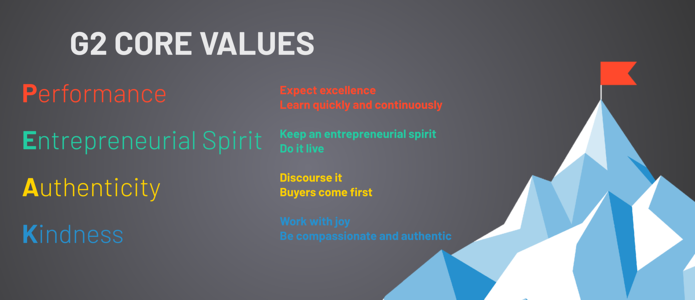
Consumers strive to have a personal connection with organizations. The world of business has shifted to the point where selling a product is no longer enough, and consumers want a lasting bond between brands and themselves. Company core values are a way to identify why you do what you do, and why someone should care enough about those same things to support your organization.
Defining core values true to your organization isn’t always an easy process, but it’s important to spend adequate time establishing them. Company core values aren’t just a list of buzzwords. Having inaccurate company values — or none at all — can give off the impression that your organization doesn’t have a greater mission behind your actions. With just a few steps, you can define accurate company values.
How G2 Defined Our Authentic Company Core Values
Identifying company values that are true to your organization is no easy process. It takes time, effort, and contribution from every team member, no matter their ranking. The process and values are individual to each organization, and they are subject to change as your business transforms and grows. If done right, company core values give you the potential to stand out in your industry.
Understanding PEAK
At G2, we define our company culture using the acronym PEAK, which stands for Performance, Entrepreneurial Spirit, Authenticity, and Kindness. The phrase is vague, but we define each term and how it applies to the work that we do.

G2’s approach keeps our core values vague. However, the team has further defined what each term means.
For example, the term “performance” (of course) implies a high level of performance. However, we further define “performance” as expecting excellence from all of our teams and the expectation that our employees learn quickly and continuously. By giving a detailed definition, employees aren’t confused about their meaning. Additionally, our values encompass both performance-related values and work ethic-related values.
The process of defining your company’s core values isn’t comprised of a straightforward set of directions. The process and terms are unique to your organization’s culture and mission. However, there are some general guidelines you can follow to ensure that you define core values representative of your company.
G2 also rewards and recognizes top performers using these values. We can nominate our coworkers for how their work embodies one of the four values in our internal communication Slack channel called #peakawards. By using the phrase “Living at the PEAK,” our values can resonate in the work of all teams, from Sales and Product to Employee Success.
Establish the “Why” Behind Your Company
The most important step before defining your company core values is to sit down and identify your company’s mission and purpose. This is more than just the solution your company offers to the marketplace — it’s why you continue to exist and the reason behind what you do. It should guide your work, your culture, and why you keep moving forward.
 For older, larger companies, your company’s mission is probably already defined. If you have one already, evaluate it before you define your company’s values. Ensure it represents your company’s purpose and vision for the future. If you don’t find it to still hold true, be open to change. Identify the area where it falls shorts and revise.
For older, larger companies, your company’s mission is probably already defined. If you have one already, evaluate it before you define your company’s values. Ensure it represents your company’s purpose and vision for the future. If you don’t find it to still hold true, be open to change. Identify the area where it falls shorts and revise.
If your company hasn’t defined your mission and purpose, it’s important that leadership (or the whole team, depending on your size) sits down and defines the mission before defining your core company values. Figure out why your company was started, its current purpose, where it stands in the marketplace, and its vision for the future. A clear mission statement will clarify for employees and clients what you do and why. Your core values will guide how your team completes their work each day and what behaviors are expected (and encouraged) while doing this work.
Follow the Process: Brainstorm, Group, and Eliminate
When defining the core values to your company, you’re going to encounter a lot of ideas suggested from everyone involved. To create effective core values, your process should follow these three steps: brainstorm, group, and eliminate. These three steps will help you identify accurate and concise values that encompass what your company stands for.
Brainstorm
The first thing you should do to identify your company’s values is to sit down with leadership and brainstorm what behaviors you see from employees day-to-day that you want to reinforce.
 When brainstorming ideas for defining your values, you’ll need to decide who to include in the process. Many organizations choose to include leadership due to their tenure and experience with the company. Some smaller companies may choose to include everyone no matter their seniority. You can decide what ultimately works best for your organization..
When brainstorming ideas for defining your values, you’ll need to decide who to include in the process. Many organizations choose to include leadership due to their tenure and experience with the company. Some smaller companies may choose to include everyone no matter their seniority. You can decide what ultimately works best for your organization..
No matter who you include, ideate together what you believe defines your company core values. You can either format this through several structured brainstorming sessions or have a single day where you define them in one session. Be open to all ideas during this period.
Group
After you’ve compiled the responses, group similar themes together. It’s likely that you’ve received many similar answers, so keep track of which items appear most often. These are indicative of what behaviors you see that your company values.
 Once answers are grouped together, identify greater themes between these groups. It’s important to keep the values vague and relatable — you can always define them further later on.
Once answers are grouped together, identify greater themes between these groups. It’s important to keep the values vague and relatable — you can always define them further later on.
Eliminate
Finally, eliminate redundant values and remove values that aren’t representative of your company or the behaviors you want to reinforce. Remember, your values need to be accurate and true, otherwise, they won’t have any benefit. You should aim to have between three and six core values that define how your employees behave day-to-day.
 This process can be done repeatedly until you find a set of core values that formulate your value statement, which is the documented beliefs and principles of your organization. A value statement is an explanation of the fundamental things your organization holds important and is used to guide the organization and the people in it. Make sure that leadership isn’t just choosing values they want to see (or think potential clients want to see). Let the process begin naturally, and leadership should be open to any values.
This process can be done repeatedly until you find a set of core values that formulate your value statement, which is the documented beliefs and principles of your organization. A value statement is an explanation of the fundamental things your organization holds important and is used to guide the organization and the people in it. Make sure that leadership isn’t just choosing values they want to see (or think potential clients want to see). Let the process begin naturally, and leadership should be open to any values.
When defining or redefining your company values, present them to your organization and be open to feedback. You want to ensure that you have buy-in from all team members. Present these during a meeting or an all company meeting and provide a space for feedback from your team. If you have a smaller team, this can be in the form of a simple conversation, and if you have a larger team, you can provide an anonymous form. After reading through feedback, identify what areas need tweaking to be more representative of your organization.
3 Additional Tips to Make Your Core Values Great
1. Take the Necessary Time
Identifying and defining your company values isn’t a process that can happen in a quick meeting. It can take anywhere from a few days to a few months, so don’t rush the process. This can lead to inaccurate or shallow company values.
 How you allocate time to work on this project is up to your team and what works best for everyone. If you’re a smaller team, consider blocking off time at the end of all company meetings to brainstorm or start grouping similar themes. If your organization is large or spread out among multiple offices, you can use a form and have the leadership team participate in a few meetings to hash out the details.
How you allocate time to work on this project is up to your team and what works best for everyone. If you’re a smaller team, consider blocking off time at the end of all company meetings to brainstorm or start grouping similar themes. If your organization is large or spread out among multiple offices, you can use a form and have the leadership team participate in a few meetings to hash out the details.
While you don’t want to rush through defining your company core values, be careful to not spend too much time on this process. Overthinking your core values might derail the process, so ensure your meetings are efficient with structured brainstorming, agendas, and an action plan for the following meeting.
2. Be Open to Change
A company can easily change within six months, a year, or even a decade. As it grows, your company will experience changes in everything from employees and culture to organizational structure, and even possibly your product. It’s important to recognize that your company core values could be subject to change as well, so be sure to block off time to analyze the state of your vision and values.
 Every few years, sit down as a leadership team to evaluate your company’s mission, vision, culture, and values. Repeat the defining process to see where your company stands against your published statements. If changes are needed, be open to them.
Every few years, sit down as a leadership team to evaluate your company’s mission, vision, culture, and values. Repeat the defining process to see where your company stands against your published statements. If changes are needed, be open to them.
3. Live Your Values
Your defined company values should be more than just a printed list hanging on a wall or a section in your employee handbook. They should be a guide to how your employees behave day-to-day. Your leadership team should be the driving force behind your core values, and your employees will follow suit.
 Make sure that your leadership is rewarding employees for living out the company’s core values. At G2, we recognize employees monthly that are going above and beyond to display PEAK behaviors. This puts them in the running to become the PEAK Professional of the Year, which we award at year-end to outstanding G2 employees.. Reinforcing positive behaviors and actions that display your company culture will help reinforce these beliefs.
Make sure that your leadership is rewarding employees for living out the company’s core values. At G2, we recognize employees monthly that are going above and beyond to display PEAK behaviors. This puts them in the running to become the PEAK Professional of the Year, which we award at year-end to outstanding G2 employees.. Reinforcing positive behaviors and actions that display your company culture will help reinforce these beliefs.
The values that you define as your core company values should be integral to your organization’s work. Dedicate the time and effort needed when establishing them. By making sure they are the best fit for your organization, you can create long-lasting company values that resonate with all of your team.
 Anastasia Masters is a Content Marketing Associate at G2.com. She graduated from the University of Michigan with a degree in history. In her spare time, Anastasia enjoys eating her way through Chicago’s different neighborhoods, planning her next trip, and binging a new show on Netflix. You can follow her on Twitter at @anastasia_mm0.
Anastasia Masters is a Content Marketing Associate at G2.com. She graduated from the University of Michigan with a degree in history. In her spare time, Anastasia enjoys eating her way through Chicago’s different neighborhoods, planning her next trip, and binging a new show on Netflix. You can follow her on Twitter at @anastasia_mm0.
